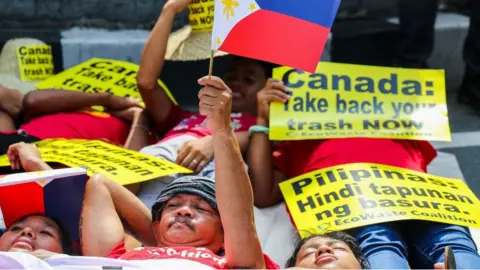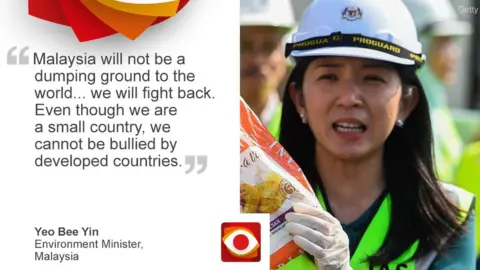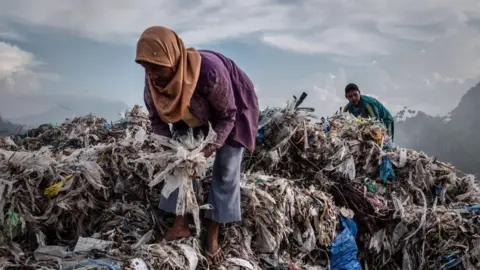Why some countries are shipping back plastic waste
 Getty Images
Getty ImagesA growing number of countries are taking a stand and demanding that nations take back their waste.
Many wealthy countries send their recyclable waste overseas because it's cheap, helps meet recycling targets and reduces domestic landfill.
For developing countries taking in the rubbish, it's a valuable source of income.
But contaminated plastic and rubbish that cannot be recycled often gets mixed in and ends up in illegal processing centres.
So where is this happening and why is action being taken now?
 Getty Images
Getty ImagesThe European Union is the largest exporter of plastic waste, with the US leading as the top exporter for a single country.
But only a tiny fraction of all plastics ever produced has been recycled.
Often, materials that can't be recycled end up being burned illegally, dumped in landfills or waterways, creating risks to the environment and public health.
Worries about receiving such waste has forced countries to act.
The Philippines has just shipped back tonnes of rubbish to Canada that it said was falsely labelled as plastic recycling in 2013 and 2014.
This month Malaysia sent back five containers of plastic waste to Spain after it was found to be contaminated.
Malaysia says up to 3,000 tonnes of rubbish will soon be returned to the UK, US, Japan, China, Canada, Australia, the Netherlands, Germany, Saudi Arabia, Singapore, Bangladesh, Norway and France.
To understand why these countries were swamped with so much waste, you need to look to China.
Until January 2018, China imported most of the world's plastic waste.
But due to concerns about contamination and pollution, it declared it would no longer buy recycled plastic scrap that was not 99.5% pure.
 Getty Images
Getty ImagesThe impact of China's ban
Global plastic waste exports fell - dipping by almost half by the end of 2018, compared with 2016 levels, according to Greenpeace analysis.
There were reports of plastic waste ready for export piling up, and some was diverted to other countries.
Malaysia, Vietnam, Thailand, Indonesia, Taiwan, South Korea, Turkey, India and Poland all took up the slack.
Malaysia took a major share - the plastic waste it imported from 10 countries in just the first six months of 2018 was nearly as much as the total it received in 2016 and 2017.
But the rubbish arriving in these countries wasn't sufficiently recyclable, and it has caused problems.
The UK has been singled out by the Malaysian government.
"What the citizens of the UK believe they send for recycling is actually dumped in our country," said Malaysian Minister Yeo Bee Yin.
Countries taking action
Importing countries have found the surge of waste difficult to manage and this has led to new controls in some countries.
Poland, in May last year, announced tougher rules after multiple fires at waste dumps, and linked the rise in illegal rubbish imports to the China ban.
Thailand has temporarily prohibited plastic waste imports and says it will implement a full ban by 2021.
Malaysia has revoked import permits and has been clamping down on illegal processing plants.
Vietnam is no longer issuing new licences and will bar all imports of plastic scrap by 2025.
In October, Taiwan said it will only import single source plastic waste.
India expanded its ban on solid plastic waste imports this March.
Allow X content?
However, there is still an overwhelming demand for locations to send plastic and other waste to for recycling, and the challenge of how to dispose of it remains.
There are indications that after some initial success of the import restrictions, these countries are starting to take in larger volumes of waste again.
The Global Alliance for Incinerator Alternatives (Gaia) says after a clear dip, "imports have begun rising again in the last quarter of 2018, suggesting challenges in enforcing respective country bans".
In 2016, 235 million tonnes of plastic waste was generated globally.
On current trends, this could reach 417 million tonnes per year by 2030.



